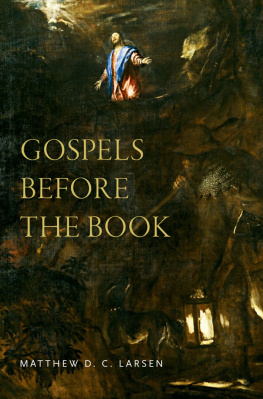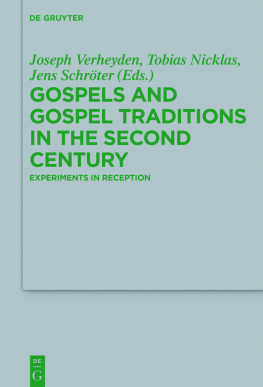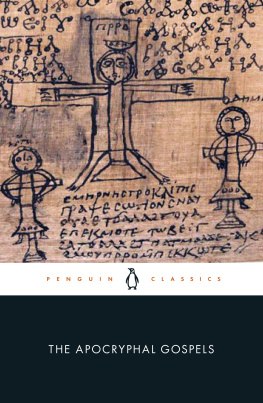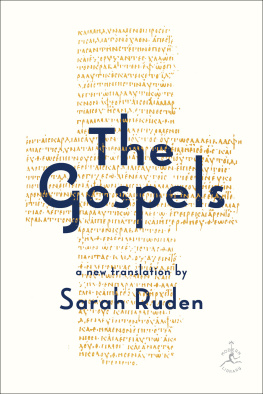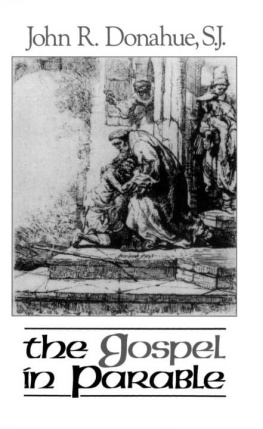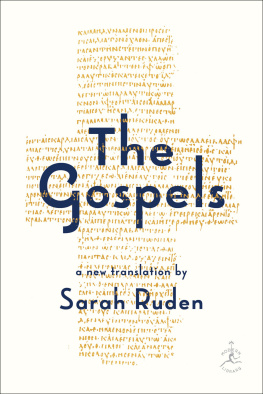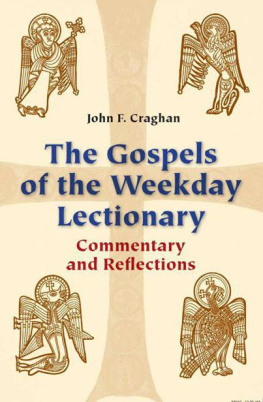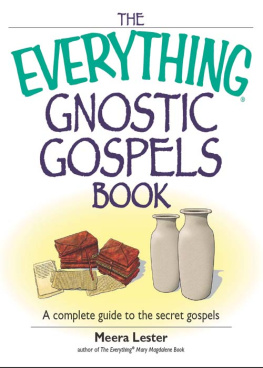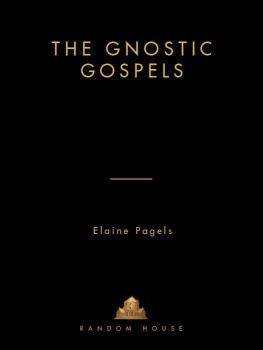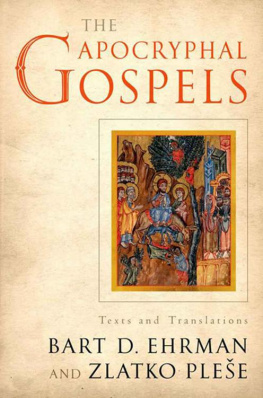Gospels before the Book

Oxford University Press is a department of the University of Oxford. It furthers the Universitys objective of excellence in research, scholarship, and education by publishing worldwide. Oxford is a registered trade mark of Oxford University Press in the UK and certain other countries.
Published in the United States of America by Oxford University Press
198 Madison Avenue, New York, NY 10016, United States of America.
Oxford University Press 2018
All rights reserved. No part of this publication may be reproduced, stored in a retrieval system, or transmitted, in any form or by any means, without the prior permission in writing of Oxford University Press, or as expressly permitted by law, by license, or under terms agreed with the appropriate reproduction rights organization. Inquiries concerning reproduction outside the scope of the above should be sent to the Rights Department, Oxford University Press, at the address above.
You must not circulate this work in any other form and you must impose this same condition on any acquirer.
Library of Congress Cataloging-in-Publication Data
Names: Larsen, Matthew D. C., 1982 author.
Title: Gospels before the book / by Matthew D. C. Larsen.
Description: New York, NY : Oxford University Press, 2018. |
Includes bibliographical references and index.
Identifiers: LCCN 2018001337 | ISBN 9780190848583 (hardcover : alk. paper) |
ISBN 9780190848606 (epub) | ISBN 9780190848613 (online resource)
Subjects: LCSH: Bible. MarkCriticism, interpretation, etc.
Classification: LCC BS2585.52 .L37 2018 | DDC 226.3/06dc23
LC record available at https://lccn.loc.gov/2018001337
For Lauren
Nothing conclusive has yet taken place in the world, the ultimate word of the world and about the world has not yet been spoken, the world is open and free, everything is still in the future and will always be in the future.
M. M. , 166
Nothing is absolutely dead: every meaning will have its homecoming festival.
M. M. Bakhtin, Methodology for the Human Sciences, in Speech Genre and Other Late Essays, 170.
Contents
THIS IS A book about unfinishedness and unfinalizability. It is also a book about writing practices, reading practices, and the intersection of the two. I cannot tell you how many times over the past six years, after a colleague read a draft of some portion or prior paper and offered feedback, that I heard the joke, your own work, like the claims it makes for early textual traditions of the gospel, is itself unfinished, rough, and in need of polishing. They were not wrong, both in terms of style and argumentation. The manuscript and the ideas it attempts to convey were consistently being reworked and altered over many years, in many contexts, and received feedback from many colleagues, both formally and informally (too many to cite here). The work remains in my mind (to use the language of Eva Mroczek) more of a process, rather than a product. It exists in a more polished form today than it did previously. Yet I cannot avoid the senseeven now, as I take the final step of writing the preface before sending the manuscript to the printerthat my book is still unfinished. It has been said that authors never truly finish books; they just release them. Given the topic of my book, I welcome, acknowledge, and accept this humbling reality. My book makes its aim to point out the problems that have beset scholars on early gospel writing for some time and to gesture toward new paths for future research. Such a book, if successful, can never be a final or definitive word on a matter. The goal, to use Bakhtins terms, is to produce centrifugal rather than centripetal discourse.
In terms of influence and thanks, there are many to mention. Eva Mroczeks and Sean Gurds scholarship have been constant conversation partners throughout my project. I have cited them often throughout the book, though I also want to cite them here as important contributors to my overall thinking throughout the argument. Both have offered helpful insight and encouragement over conversations and emails through the years. Professors during my time at Yale provided the ideal intellectual environment for my research. I thank especially my doctoral advisor Dale Martin and my dissertation readers, Steve Davis, Ann Hanson, and Harry Attridge. Many others deserve hearty thanks for their guidance, support, and mentorship, especially Hindy Najman, Adela Yarbro Collins, Irene Peirano Garrison, Katie Lofton, Michel Beth Dinkler, Andrew McGowan, Felicity Harley McGowan, Greg Sterling, JanJan Lin, Kirk Freudenburg, Steven Fraade, Chris Hayes, John Collins, Bentley Layton, and Maria Doerfler. Several scholars outside of the Yale community generously offered guidance, helpful critique, and inspiration over the years. Especially worthy of mention are Jennifer Knust, AnneMarie Luijendijk, Brent Nongbri, Eldon Epp, Ren Falkenberg, Liv Ingeborg Lied, and Abraham Smith. Many days and evenings were spent discussing ideas related to this book with my graduate cohort: Olivia Stewart Lester, Zachary Smith, Sonja Anderson, Tyler Smith, Christina Harker, James Nati, Laura Carlson, Matt Croasmun, Mary Farag, Simcha Gross, Pratima Gopalakrishnan, Dan Schriever, Mark Lester, Dan Bohac, Dexter Brown, Tim Gannett, Tom Schmidt, Stephanie Machabee, Danny Eastman, Austin Rivera, Shlomo Zuckier, and Justin White. To all of you, the next pizza at Wall Street is on me. I must offer thanks to Greg Given and Mark Letteney both for their joyous friendship and their tremendously insightful feedback on previous drafts of the manuscript. Each of these colleagues has enriched and improved this work in their own way.
I thank Steve Wiggins, my editor, and his colleagues at Oxford University Press, as well as Anitha Jasmine Stanley at Newgen, for their work and guidance through the process of review and publication. I also want to thank Acacia Chan for her hard work on the project and especially for her help in indexing the book. My family deserves more space here than I fear I am allowed in this preface or than many readers would endure. It is not hyperbole when I say: I cannot thank them enough. My wife, Lauren Carter Larsen, is the perfect partner in life, dearest friend, ideal co-adventurer, co-parent, artist, creative inspiration, and inimitable running partner. I can only thank you unequivocally and with a full heart for believing in my work on this project and the sacrifices youve made to allow me to write this book. I dedicate it to you, because you believed in it the most, even (especially) at the times when I felt most weary. I apologize for how often I pestered you with the question, hey, does the sentence sound better like this or this? But I reluctantly admit I dont really regret it because the book is so much better as a result of your input. If the reader finds the prose herein not too burdensome, thank Lauren. My children, Lucy, August, and Eleanor, grew up with this book in a very real sense. This book was produced in the midst of your births, upbringing, schooling, joys, tears, laughter, excitements, and frustrations. It came into being despite broken bones (both yours and mine), illness (both yours and mine), sleepless nights (both yours and mine), travel, life transitions, and various other obstacles. Your joy and excitement in life inspire me. I am thankful every day to be your father. I hope, when you read this book one day in the future, it makes you proud and you remember its creation fondly. I also thank my parents, David and Vicky Larsen. Your lives are an example of faithfulness and generosity. I am sure, had it not been for your influence both as a child and as an adult, I would not have written this book.

